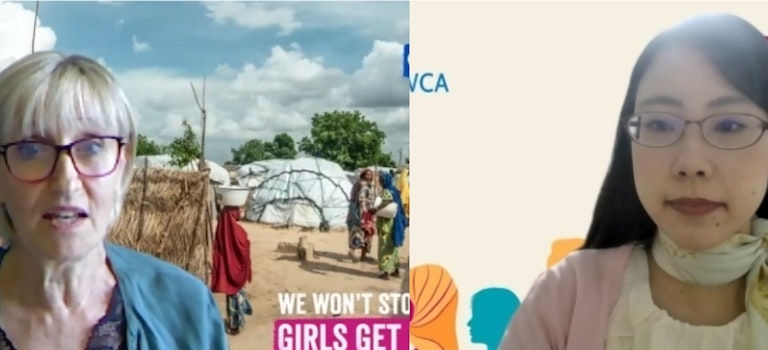On 11 October 2022, to celebrate the International Day of the Girl, Plan International, Young Women Christian Association (YWCA) and International Gender Champions (IGC) co-organised the workshop Voice, Empowerment and Girls’ Active Participation. Champions and young people, including mentees, shared their experiences and perspectives on how to increase youth’s meaningful participation in decision-making.
The session began with a powerful speech by Anne-Sophie Lois, Senior UN representative for Plan International in New York and Geneva, and IGC Global Board member, outlining key feminist principles for an intersectional approach to leadership. These include fostering leaders’ self-awareness to assess where they stand and how to improve, engaging in active listening without constantly putting forward priorities, working to tackle biases, and learning how to deal with vulnerability. The principles also included the ability to bring systemic perspectives to an organisation and learning how to take into account the power and privilege inherent to many leadership positions.
Speakers, including young leaders from the World YWCA and Plan International, then began to unpack the topic of meaningful youth participation. They drew attention to the structural and cultural constraints young people - especially girls - face when attempting to contribute to the decision-making process. A significant obstacle underlined by all the participants is the tendency - widespread in many organisations - to dismiss young voices because of their lack of experience. According to this mindset, higher age automatically equals better results, and frequently intersects with the sexist attitudes and beliefs dominating many workplaces. To overcome these obstacles, speakers highlighted the necessity of actively creating safe environments where young women and girls can make their voices heard, such as a youth advisory board. The IGC GBV Pledge also provides a central tool to promote a safer space where they can directly engage in the decision-making sphere.
In breakout rooms, participants shared their personal experiences. One speaker highlighted how strong mothers teach their daughters how to stand up for what they want, but no one teaches them how to do that in their professional careers. That is where mentorship and traineeship opportunities must be increasingly made available, yet many internships are unpaid, making them accessible for the privileged few. Developing learning paths, providing paid internships, promoting structured and sustained dialogue with young people across an organisation, and facilitating the transition from education to the professional world are just some of the many measures which can be achieved with political will. From a practical standpoint, bringing donors on board represents a crucial precondition for achieving these goals. They must be convinced to allocate growing shares of funding and time to training and supporting young people within the non-profit sector. Speakers agreed that safeguarding and empowering young women and girls requires us to engage men and boys so that they see the benefits for everyone and don't feel threatened. They must be continuously supported in learning and adopting new attitudes, beliefs and values vis-à-vis the role of women.
In conclusion, the conversation highlighted that leadership happens at all levels and in all spaces, and young people’s voices are critical to effective and inclusive decision-making now and in the future. Champions can help to change the structures which side-line young people, enabling scholarships, mentorships and paid traineeships, creating flexible learning and career pathways, and ensuring sufficient funding for these goals.
